深圳 七年级英语 unit 2 daily life words and reading 精品版
七年级英语上册 unit2 Our Daily Life教案 牛津深圳版
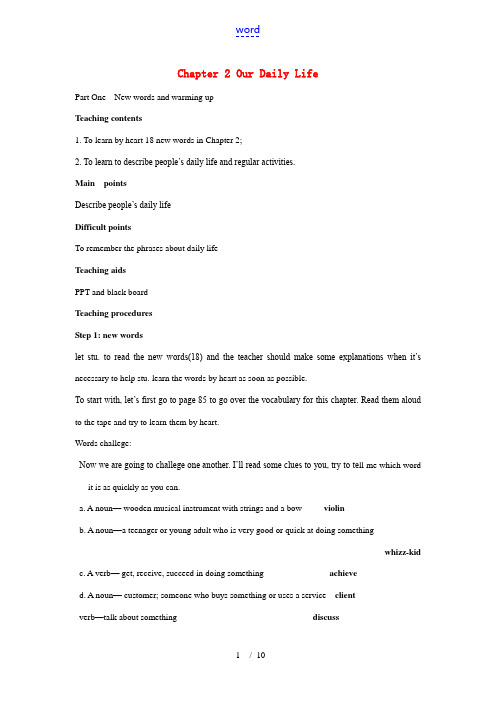
Chapter 2 Our Daily LifePart One New words and warming upTeaching contents1. To learn by heart 18 new words in Chapter 2;2. To learn to describe people’s daily life and regular activities.Main pointsDescribe people’s daily lifeDifficult pointsTo remember the phrases about daily lifeTeaching aidsPPT and black boardTeaching proceduresStep 1: new wordslet stu. to read the new words(18) and the teacher should make some explanations when it’s necessary to help stu. learn the words by heart as soon as possible.To start with, let’s first go to page 85 to go over the vocabulary for this chapter. Read them aloud to the tape and try to learn them by heart.Words challege:Now we are going to challege one another. I’ll read some clues to you, try to te ll me which word it is as quickly as you can.a. A noun— wooden musical instrument with strings and a bow violinb. A noun—a teenager or young adult who is very good or quick at doing somethingwhizz-kidc. A verb— get, receive, succeed in doing something achieved. A noun— customer; someone who buys something or uses a service clientverb—talk about something discussf. A noun—a person who controls a business or part of it. managerg. A noun—the person (in a pany) who looks after the money and keeps the financial records accountanth: in the morning a.m.i: in the afternoon p.m.j: help sb. do sth. assistk: go to attendl: a pany businessStep 2: warming-up by looking at the picturesLook at the pictures and to know the phrases about daily life describing on the picturesThen ask the students what do they do every day, every week(use phrase)show PPT to students when they answer the questions(the phrases about daily life describing)Step 3: work in pairs to describing Ss’ daily lifelet’s Ss work in pairs to describe What kind of things do they do every day? What kind of things do they do once or twice a week? And what kind of things do they never do?write these patterns on the blackboard:I……every day.I……once or twice a week. I never ……(Encourage students to speak up their daily activities as many as possible.)e.g. A: What kind of things do you do every day?B: I clean my teeth, wash my face and hands, make a telephone to my parents, watch television, go to school, do my homework every day.A: What kind of things do you never do every day?B: I never play the piano, ride a bike, go to the supermarket, argue with other classmates, e to school late.A: What kind of things do you do once or twice a week?B: I eat fish, play tennis, play puter games, go to the concert, eat chocalates, take a bus onceor twice a week.Step 4: Homework1. Preview the Reading in Chapter 2;2. Learn the new words by heart.Part Two Reading (1)Teaching contents:1.How to describe our everyday activities and how often we do things.2.The daily life of a ‘whizz-kid’ studentMain pointsRead the text and abstract the important information from the textDifficult pointsChange the information into chartTeaching aidsmultimedia, tape-recorder, PPTTeaching produceduresStep 1: leading-inAsk the students when they usually get up in the morning, when they go to school and so on . Then lead in the topic of this chapter ‘ Our Daily Life’. And show them some pictures and let them do the ‘ask and answer’ activity.Which of these things do you do every day / do once or twice a week / never do?Step 2: pre-readingLet students talk about their daily life, and then pare with the life of Wendy (look at the picture). Step 3: while-readinga. Skim the text and use one sentence to abstract the main idea of the text.b. Scan the text and to get the main idea of each paragraph, finish this chartP1 Wendy describes her school. She finds some school work easy but boring.P2 At lunch-time she sometimes has lunch with a business client.P3 Wendy describes her morning routin and the background to her family puterbusiness.P4 Wendy’s driver takes her to school in her own car.P5 In the evenings she works on her puter games.P6 Wendy describes her after-school activities.c. Read the text again and find the facts. Turn to page 18 plete the list with information that Wendy gives us in her article. Write only notes (one to three words or figures) for each answer.1. What she writes puter games2. when she gets up 6 a.m.3. How she gets to school 7.30 a.m4. How she gets to school in her car5. What she does on the way makes phone calls6. Her usual grade at school A7.when she goes to puter Club Friday8.when she has dinner 7 p.m.9.Her work after dinner writing puter games10.when she goes to bed 11 p.m.Step 4: post-readingAsk the students to read the passage again and do the exercises on page 19 in the book.Step five: summary1.how to talk about our regular activities we do every day or every week / month2.what does Wendy do every day?Step 6: homeworkExercise book page 13-14Do a survey of “how often do you…” (see in PPT)Part Three Reading (2)Teaching contentsLanguage points in the textTeaching aims and demandsTo find out and analysis the usage of language points (phrases and words) Main points14 phrases and 4 words usagesDifficult pointsPut on/ wear/ have on the difference among them, assist, attend Teaching aidsPPT and black boardTeaching proceduresStep 1: warming-upListen to a song: Here I amStep 2: language points learninga.the top studentb.must bec.businessd.put on/wear/have one.have breakfast/lunch/dinnerf.discussg.in my own carh.make a phone calli.on the way toj.enjoy doing sthk.achievel.fail an examm.twice a weekn.attendo.have puter club meetingp.assist sb with sthq.continue to do sth/continue doing sthExpain them one by oneStep 3: HomeworkExercise book page 15;Preview the Language in Chapter 2.Part Four LanguageTeaching contents1. How to use verbs in the simple present tense to talk or write about things happening all the time or a number of times.2. How to use adverbs and adverbial phrases to say how often things happen.Teaching aidsmultimedia, tape-recorder, PPTTeaching produceduresStep 1: leading-inAsk the students what Wendy usually do in his daily life. Then lead in the language of this chapter ‘ the simple present tense’. Give them some sentences of the simple present tense, and ask them to find out the structure of the tense.Step2:1.help them find out the structure of the simple present tense肯定句:主语+am/is/are+其它成分.主语(除第三人称单数)+动词原形+其它成分.否定句:主语+am/is/are not+其它成分.主语(除第三人称单数)+don’t+动词原形+其它成分.一般疑问句:Am/Is/Are+主语+其它成分?Do +主语(除第三人称单数)+动词原形+其它成分?特殊疑问句:疑问词+is/am/are +主语+(其它成分)?疑问词+do +主语+动词原形+(其它成分)?The consistent of simple past tensea. I like fish./he likes fish.I am a student.b. I don’t like swimming./they are not in the library.c. is it a tall tree?/ does the earth go around the sun?d. What time is it now?2. help them to find out the rules of verb changea. –sb. s, x, sh, ch, o –esc. constant songs+y -ies3. do some exercisesStep 3:1. read the sentenses in the book and find out the usage of the adverbs and adverbial phrases Find out the difference of the words:always --- usually --- often --- sometimes --- seldom --- never2. do some exercisesStep 4: consolidationDo exercises1.How to use verbs in the simple present tense to talk or write about things happening all thetime or a number of times.2.How to use adverbs and adverbial phrases to say how often things happen.Step 6: homeworkExercise book page 15-16Part Four Listening & SpeakingTeaching contents:Get the students to know some listening skill ( make notes).Get the students to know how to describe a daily life.How to describe our everyday activities and how often we do things.Teaching aidsmultimedia, tape-recorder, PPTTeaching producedures:Step one: Lead in and pre-listeningwhat does your father or mother do every day?Predicting: where, when, whatStep two: while-listening1.play the tape for the first time. Get the students to know the general idea of the listeningmaterial with writing anything.2.students listen for the second time and work out which person is talking. Then check theanswer.3.play the recording again and ask students to plete part B.Step 3: post-listening1.hand out the tapescript and find out the words they listen to.2.read the tapescript.Ask the students about the daily life of Wendy, let them use the Yes / No to answer the questions.1. Is Wendy still a student?2. Does Wendy drive herself to school?3. Does Wendy fail an exam?4. Can Wendy play the violin?5. Does Wendy have breakfast at 7:30 a.m.?6. Does Wendy like her school friends?Step 5: presentation1.Ask the students to pay attention to the teacher’s voices.When we ask a Yes/No question, we make our voices rise at the end. Also we make our voices rise to show politeness.2. ask them to do some practice.Step 6: speak-upWork in pairs to find out about your classmate’s habit s. Ask your partner the questions and write down the answers.Step 7: homeworkExercise book page 18-19Part Five WritingTeaching contentsHow to write about a person’s daily life.Teaching aidsmultimedia, PPTTeaching produceduresStep 1: leading-inRetell the story of Wendy using the simple present tense.Review what we learnt in chapter 2 and arouse students interest towards the topic.Step 2: discussionGive some key words and ask them how to write them into a correct sentence.1.play basketball, her friend, from 4.00 to 4.30 p.m., at school, once a weekShe plays basketball with her friend from 4.00 to 4.30 p.m. at school once a week.2.live nearby, always walk to school, go to school, 7.45 a.m., usually arrive, 8 a.m.She lives nearby and always walks to school. She goes to school at 7.45 a.m. and usually arrives at 8 a.m.Step 3: write a sentence correctlyExercise in the book on page 27.Step 4: writing a short story about a girl’s everyday life.Fangfang is my best friend. She lives a healthy life. S he gets up at six o’clock every morning…Step 5: summary1. how to write about our regular activities we do every day or every week / month2. what does Wendy do every day?Step 6: homeworkExercise in the student’s book page 27。
深圳七年级英语新教材Unit2知识清单
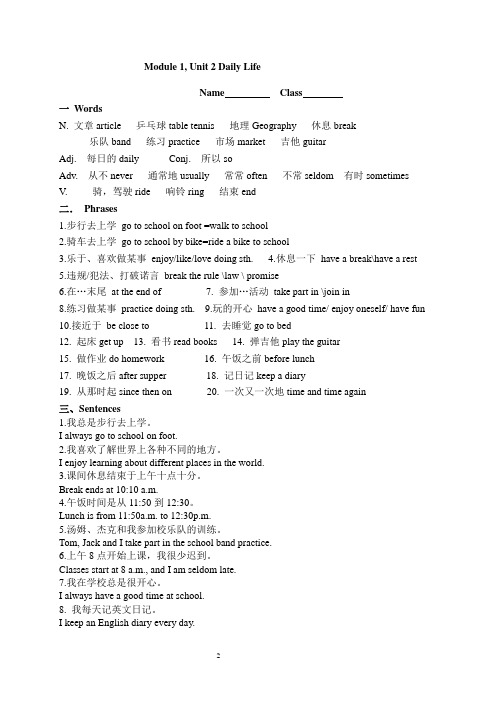
Module 1, Unit 2 Daily LifeName Class一WordsN. 文章article 乒乓球table tennis 地理Geography 休息break乐队band 练习practice 市场market 吉他guitarAdj. 每日的daily Conj. 所以soAdv. 从不never 通常地usually 常常often 不常seldom 有时sometimes V. 骑,驾驶ride 响铃ring 结束end二.Phrases1.步行去上学go to school on foot =walk to school2.骑车去上学go to school by bike=ride a bike to school3.乐于、喜欢做某事enjoy/like/love doing sth.4.休息一下have a break\have a rest5.违规/犯法、打破诺言break the rule \law \ promise6.在…末尾at the end of7. 参加…活动take part in \join in8.练习做某事practice doing sth. 9.玩的开心have a good time/ enjoy oneself/ have fun 10.接近于be close to 11. 去睡觉go to bed12. 起床get up 13. 看书read books 14. 弹吉他play the guitar15. 做作业do homework 16. 午饭之前before lunch17. 晚饭之后after supper 18. 记日记keep a diary19. 从那时起since then on 20. 一次又一次地time and time again三、Sentences1.我总是步行去上学。
I always go to school on foot.2.我喜欢了解世界上各种不同的地方。
牛津深圳版七上Unit 2Daily lif教材整合2

桃园中学英语学科整合学习教程(Unit 2----Part 2)一、词汇笔记:1.daily: adj.日常的=everyday; adv.每天=every day;daily是day+ly变形而来;例如:日常英语daily English = everyday EnglishI get at least 3 e-mails daily. = I get at least 3 e-mails every day.2. love: v.爱;n.爱;同根词汇lovely:adj.可爱的;lover:n.爱好者/爱人;love+n.喜欢某物如:I love basketball.love to do sth. 强调一次或偶然的喜欢love doing sth. 强调习惯性或经常性的喜欢fall in love with sb. 爱上某人She loves ________ the guitar very much. A. play B. playing C. plays3.seldom: adv.表示很少几乎不;seldom=hardly=rarely表示很少几乎不都是表示否定含义的副词,如:I seldom / hardly / rarely go to the cinema.He lives close to his office, so he _______ goes to work by bus.A. oftenB. seldomC. usually4.enjoy:v.喜欢享受enjoy doing sth = love doing sth = like doing sth喜欢做某事enjoy oneself = have fun = have a good time 玩得高兴Do you enjoy ________ ? A. go fish B. go fishing C. going fishing5.end: v.结束;n.最后部分末尾;同根词汇:ending:n.结尾结局;endless:adj.无止境的at the end of sth.在某物的尽头;in the end = at last = finally终于最后选词填空at the end of还是in the endWe had a meeting _______________ last month. He found his key _____________. 用end的同根词汇填空:Not every fairy tale has a happy _______________.6.practice:n.练习; 同根词汇:practise: v.练习practice doing sth: 练习做某事如:I practiced running yesterday.7.remember:v.记得;反义词forget:v.忘记,和remember用法类似remember to do sth.: 记得去做某事(指将要做的事,还没有做)remember doing sth.:记得做过某事(事情已经做过了);It’s raining heavily outside, please remember __________ the windows.A. closeB. to closeC. closing8.help:v.帮助; n.帮助;同根词汇:helpful: adj.有用的有益的;helpless: adj.无助的help sb. with sth.在某方面帮助某人I helped them with this job.help sb. to do sth. = help sb. do sth. 帮助某人做某事can’t help doing sth. 忍不住做某事help oneself to sth.随便用或吃某物;自便help sb. out帮助某人摆脱困境9.go to bed: = fall asleep:入睡表示瞬间动作;be asleep:睡着了表示延续动作选go to bed/ fall asleep还是be asleep填空IF you want to keep healthy, you should _____________ early and get up early. Look! The dog ________________.二、词汇变身:ually(形容词adj.): _______________2. daily(同义词): _______________3.ride(过去分词): _______________4. end(同义词): _______________5.practice(动词v.): _______________6. tooth(复数): _______________7.foot(复数): _______________ 8. class(反义词): _______________9.junior(反义词): _______________ 10.seldom(反义词): _______________三、词汇应用:1.break(v.); break(n.)①They always worked all day without a ____________ . How hard they were!②Do n’t ____________ my sunglasses.③He ____________ his leg when he rode a bike.2.ring(v.); ring(n.)①Students run out of the classroom as soon as the bell ____________.②I ____________you yesterday but you weren’t in.③There is a ____________ around his finger.3.practice(n.); practise(v.)①There is a football ____________ every weekend.②In this lesson, we will ____________ using some new words.4.end(v.); end(n.)①The lesson ____________ with an interesting story.②At the ____________ of the road, there is a red house.③They walked out of the forest in the ____________ .5.ride(v.); ride(n.)①George taught him how to ____________ a horse.②Would you like to go for a ____________ ?③The little boy ____________ on his father’s shoulders when I saw him.6.enjoy oneself; enjoy doing①----What should I do in my free time?----Get out and enjoy ____________ (your), make new friends.②I enjoy ____________ (go) to park and ____________ (fly) kites.7.play with sth./sb.①She likes to ____________ ____________ her little pets.②I don’t need you to ____________ ____________ ____________ (me)!----Yes. Please write it down on your notebook.8. different(adj.); difference(n.)①In the forest, we can find many ____________ kinds of plants.②There is no ____________ between the two pictures on the wall.四、用时间状语(at 8 a.m.; in the morning/afternoon/evening; from 11:50 a.m. to 12:30 a.m.; when the bell rings; after lunch; between 8 and 9 in the evening; later in the afternoon)和相关的动词(start/begin; end)来描述与日常生活:1.Tom每天在6:20a.m.起床。
牛津深圳初中英语七年级上册Unit 2《Daily life Writing》精品课件

Fang Fang usually __h_a_s_d_i_n_n_e_r__ at 6:30 p.m. She sometimes watches TV in the evening. She always g_o_e_s__to__b_e_d_a_t__9_p_._m_._.
最新初中英语精品课件设计
After school, she _p_l_a_y_s___ __b_a_sk__et_b_a_l_l _w_i_th__f_r_ie_n_d_s___ __tw__ic_e_a__w_e_e_k_. She __g_o_es__h_o_m_e__ at 4.45 p.m.
最新初中英语精品课件设计
One possible version: Zhang Qiang’s Daily Life Zhang Qiang is a junior high school student in Shenzhen. He gets up at 6 every day and reads English for 15 minutes. Then he has breakfast. He goes to school at 7 o’clock. He has 5 lessons in the morning. Then he goes home to have lunch.
最新初中英语精品课件设计
Fang Fang’s daily life
Read Fang Fang’s daily schedule below and complete the article about her daily life.
6.30 a.m.
get up
7 a.m.
Unit2+词汇+课件2023-2024学年牛津深圳版英语七年级上册
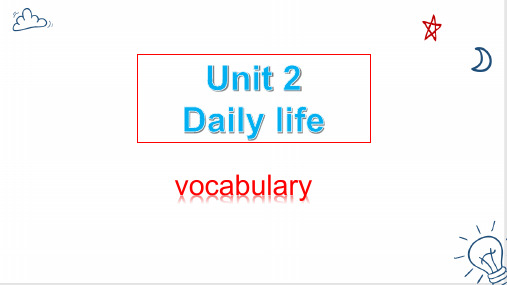
Sam goes back home. Sam goes to bed very early. Sam has a good time at school.
go to bed have a good time
Sam’s daily Life
The children play games together during the m__o_rn_i_n_g b_r_e_ak__ . 4. 他在课后参加各种各样的活动。
He __ta_k_es__p_ar_t _in___ all kinds of activities after school.
1. 昨天我过得很开心,因为我见到了很多老朋友。 I __h_a_d _a___g_o_o_d_ t_im__e_ yesterday because I met a lot of old friends. 2. 我妈妈从早到晚都在做家务。
My mother does the housework __fr_o_m morningto____ night. 3. 在早上休息期间,小朋友们一起玩游戏。
2. When I was doing my homework at home yesterday afternoon,
suddenly the door b_e_ll___ rang.
3. Starting to speak a foreign language takes lots of p_ra_c_t_ic_e__. 4. It u_su_a_l_l_y_____ snows hard in winter in Harbin because its
牛津深圳英语七年级上册unit2DailyLife

牛津深圳英语七年级上册unit2DailyLifeUnit 2 Daily life一、核心词汇daily ______________ article _____________ never________________ break n. ________ v.__________ usually____________ so____________ bell_____________ ring_____________ seldom_________________ ride_________________ guitar___________ band_____________ together____________ grade____________ Geography n._________________ market__________________ practice.n___________ v.___________二、重点短语junior high school ____________ senior high school ________________ primary school ________________ on foot ____________________take part in ________________ go to bed________________get up__________________have a good/great/wonderful time =enjoy oneself =have fun _________________________三、难点精讲1.辨析That’s right .All right与That’s all right①That’s right 对的,正确的。
(对别人所说的话表示肯定)②All right 好吧;身体康复了;令人满意的③That’s all right 不用谢;没关系(客气话和道歉的回应)运用:(1)----What’s four and six?---- It’s ten. ---- ____________.(2)----Let’s play football.--- ___________.(3) --- Thank you very much.---- ____________.2.Which of these things do you do once or twice a week?(page16)①助动词do/does/did后面要跟动词原形;②once or twice a week每周一两次注意:在英语中,表示一次用“once”,两次用“twice”,表示三次或者三次以上就用“基数词+times”(time在这里是可数名词,表示次数,需要加“s”)如:once a week,twice a week, three(four/ five…)times a week每月三次_____________ 每月一次_______________一年一次___________________3.how often do you watch television(page 23)①how often 多久一次,询问动作发生的频率(上节学过的特殊疑问句,现在再②watch televi sion= watch TV 看电视Look after“看”,强调动作的结果,但不一定是有意识地看See a movie /doctor 主要指看书、看报、看杂志Read newspaper1.____________ have you been in China?---For three years.2._____________will he back?---In five minutes.3.______________ do his parents let him watch TV?----- Three times a week.4.Classes start at 8 am, and I am seldom late.(page17)①start 在这里是不及物动词,开始。
七年级英语上Unit2dailylife(牛津深圳版)
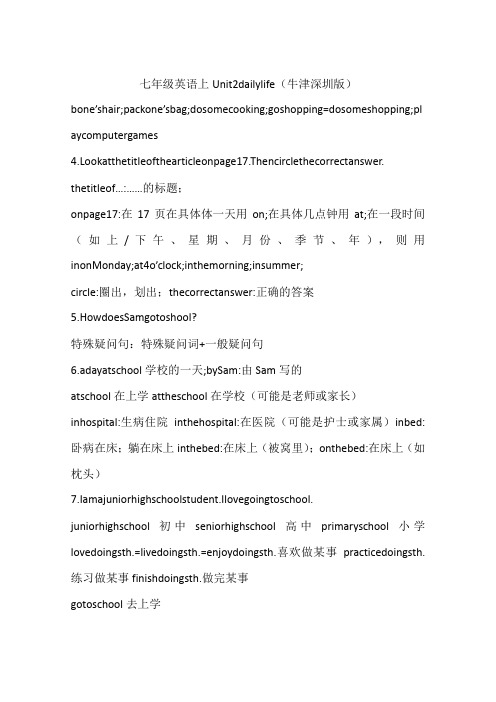
七年级英语上Unit2dailylife(牛津深圳版)bone’shair;packone’sbag;dosomecooking;goshopping=dosomeshopping;pl aycomputergames4.Lookatthetitleofthearticleonpage17.Thencirclethecorrectanswer. thetitleof…:……的标题;onpage17:在17页在具体体一天用on;在具体几点钟用at;在一段时间(如上/下午、星期、月份、季节、年),则用inonMonday;at4o’clock;inthemorning;insummer;circle:圈出,划出;thecorrectanswer:正确的答案5.HowdoesSamgotoshool?特殊疑问句:特殊疑问词+一般疑问句6.adayatschool学校的一天;bySam:由Sam写的atschool在上学attheschool在学校(可能是老师或家长)inhospital:生病住院inthehospital:在医院(可能是护士或家属)inbed:卧病在床;躺在床上inthebed:在床上(被窝里);onthebed:在床上(如枕头)7.Iamajuniorhighschoolstudent.Ilovegoingtoschool.juniorhighschool初中seniorhighschool高中primaryschool小学lovedoingsth.=livedoingsth.=enjoydoingsth.喜欢做某事practicedoingsth.练习做某事finishdoingsth.做完某事gotoschool去上学8.Myschoolisclosetomyhome,soIalwaysgotoschoolonfoot.becloseto离……近=near=beside=notfarawayfromfamily的意思是“家庭、家庭成员”,与居住的房子无关。
Unit 2Daily life 单元复习课件-英语七年级上册(牛津深圳版)

单词解析
For example
1. At the end of the party, they sang a song. 晚会结束时,他们唱了 一首歌。 2.In the end, they arrived here. 最后,他们来到这里。
拓展
1.in the end 最终;终于=at last = finally at the end of在…的尽头 end=finish 结束 2.endless adj.无止境的
【例句】 1.I play table tennis everyday 我每天都打乒乓球。
拓展
1.play tennis打网球 play volleyball打排球 play basketball打篮球 play chess 下棋 play football 踢足球 play badminton 打羽毛球 play the violin 拉小提琴 play the guitar 弹吉他 play the piano 弹钢琴 2.球和棋:零冠词 (吃早中晚饭同) 3.西洋乐器:+the
单词解析
=passage文章 paragraph段落 theory理论topic话题
For example
【例如】1.Read a student's article about his daily life.读这篇关于他日常生活的文章。 2.Today we'll discuss the use of the article.今天我们 将讨论这篇文章的用法。
单词解析
For example
【例句】 1.In the morning, we usually study Chinese. Maths and English. 在早上,我们通常学习语文、数学和英语。 2. I usually wake叩early.我通常很早就起床。
Unit 2 Daily life单元知识归纳-七年级英语上册牛津深圳版(广州沈阳通用)
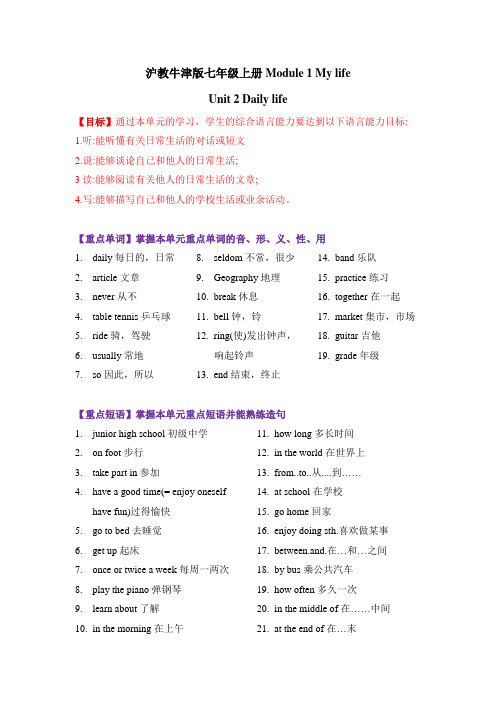
沪教牛津版七年级上册Module 1 My lifeUnit 2 Daily life【目标】通过本单元的学习,学生的综合语言能力要达到以下语言能力目标:1.听:能听懂有关日常生活的对话或短文2.说:能够谈论自己和他人的日常生活;3读:能够阅读有关他人的日常生活的文章;4.写:能够描写自己和他人的学校生活或业余活动。
【重点单词】掌握本单元重点单词的音、形、义、性、用1.daily每日的,日常2.article文章3.never从不4.table tennis乒乓球5.ride骑,驾驶ually常地7.so因此,所以8.seldom不常,很少9.Geography地理10.break休息11.bell钟,铃12.ring(使)发出钟声,响起铃声13.end结束,终止14.band乐队15.practice练习16.together在一起17.market集市,市场18.guitar吉他19.grade年级【重点短语】掌握本单元重点短语并能熟练造句1.junior high school初级中学2.on foot步行3.take part in参加4.have a good time(= enjoy oneselfhave fun)过得愉快5.go to bed去睡觉6.get up起床7.once or twice a week每周一两次8.play the piano弹钢琴9.learn about了解10.in the morning在上午11.how long多长时间12.in the world在世界上13.from..to..从....到……14.at school在学校15.go home回家16.enjoy doing sth.喜欢做某事17.between.and.在…和…之间18.by bus乘公共汽车19.how often多久一次20.in the middle of在……中间21.at the end of在…末22.at the beginning在开头23.play table tennis打乒兵球24.play computer games玩电脑游戏25.do morning exercises做早操26.have classes上课27.a piece of一片28.have lunch吃午饭29.Help sb. with sth.帮助某人做某事30.think of...as....把…看作…【经典句型】理解本单元经典句型的句意并能就本单元话题“日常生活”熟练运用这些句型1. How long is the school lunchtime?学校的午餐时间多长?2. My school is close to my home, so I always go to school on foot.我的学校离我家很近,所以我总是步行去上学。
牛津深圳版英语七上Unit 2《Daily Life》(More practice)ppt课件
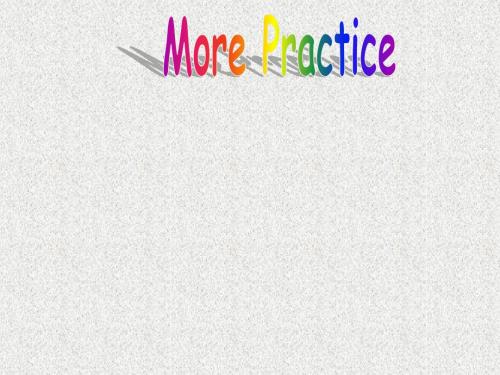
lunchtime 1-1:40p.m. 4-4:30p.m.
has one lesson (3)_________________ plays volleyball (4)_________________ with some students cooks dinner 6 p.m. (5)_________________ 6:45 p.m has dinner prepares her lessons 7:30-10p.m. (6)________________and helps me with my homework 11 p.m goes to bed
practise in pairs.
old are you You: Kelly, how ___________?
Kelly: I’m 13.
do you live You: Where ______________? Kelly: I live in Canberra, Australia. You: And Where ______________ Study? do you Kelly: I ___________ at Aranda High School. study
▲ Make a schedule about your father ’s or mother’s daily life.
Tiห้องสมุดไป่ตู้e
Activities
Exercise 1
请用适当的介词填空: 1. Jason's mum gets up _______ 6 o'clock. at 2. She always arrives _______ school early. at 3. ____ In the afternoon, she has one lesson. 4. She plays volleyball ______ with her students. 5. My father sometimes helps mewith _____ my homework. 6. We often have a walk after ______ dinner. 7. We should wash our hands before ______ dinner.
Unit2 Daily life Reading(课件)-七年级英语上册(牛津深圳版)
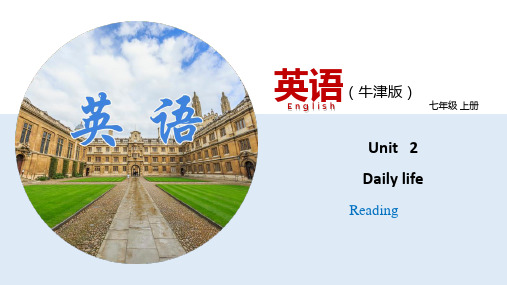
Paragraph 4 Lunch is from 11:50 a.m. to 12:30 p.m.
Paragraph 5 I always have a good time at school.
Read the first sentence of each paragraph. Then answer the questions.
I love going to school.
I always have a good time at school.
2. Find two sentences in the article to show that Sam likes sports very much.
When the bell rings, I run to the playground with my best friends Tom and Jack . We often play sports.
1 Classes start at 8 a.m., and I am seldom late.
a often
b not often
2 We have our morning break at 9:50 a.m.
a a short time between lessons b a short holiday 3 When the bell rings, I run to the playground with my best friends
friends usuallyp_l_a_y_g_a_m_e_s_. Lunch time: from _11_:_5_0__a._m_._to _1_2_:_3_0_p_._m_._.
Afternoon: Classes end at _3_:_3_0_p_._m_.__ Sam takes part in _th_e__sc_h_o_o_l_b_a_n_d__p_ra_c_t_ic_ewith his friends
七年级英语上Unit2 daily life牛津深圳版

七年级英语上Unit2 daily life(牛津深圳版)Unit Two Daily life教案授课教师日期时间学生年级初一科目英语题牛津深圳版 Unit Two Daily l教学目标要求掌握本单元的单词、短语,一般现在时教学重难点分析一般现在时的变化教学过程课前准备本周学校学习内容掌握本单元的单词、短语,一般现在时存在和要解决的问题动词碰到第三人称单数时,要进行相应的变化一般现在时的功能一般现在时常用下列副词或副词短语来作时间状语:一般现在时的构成知识要点概述Unit Two Daily life ReadingLook aures and answer the quabout your daily llook at= have a look at 看一看; answer the qulquestions(reply to 更强调书面回答,较正式); daily life:日常生活2. Wgs do you dwice a week?助动词do/does/did后面要跟动词原形;a week, twice a w(four/ five…)times a wbrush one’s teeth 刷牙; watch television= watch TV看电视; play tabl 打乒乓球; ride a bicycle骑单车; plaano弹钢琴; wash my clothes= do some washing洗衣服拓展:wash one’s face; comb one’s hair; pack one’s bag; dg; gg= dg; play computer gaLook alarticle on page 17. Tlanswle of…: ……的标题;age 17:在17页在具体体一天用on; 在具体几点钟用at; 在一段时间(如上/下午、星期、月份、季节、年),则用day; at 4 o’clock;g; in summer;le:圈出,划出;answer:正确的答案How does Sam gl?特殊疑问句:特殊疑问词+ 一般疑问句a day at school 学校的一天; by Sam: 由Sam写的at school 在上学 al在学校(可能是老师或家长)al: 生病住院al: 在医院(可能是护士或家属) in bed: 卧病在床;躺在床上bed: 在床上(被窝里);bed: 在床上(如枕头)I am a junior high school student. I love goingl.junior high school 初中gh school 高中 primal 小学 love doing sth.= live doingdoing sth.喜欢做某事 practice doing sth.练习做某事doing sth. 做完某事gl 去上学l is clI always glbe close to 离……近= near =besidar awaamily 的意思是“家庭、家庭成员”,与居住的房子无关。
深圳教材--上教版初中英语七年级上Unit2_daily_life

深圳教材--上教版初中英语七年级上Unit2_daily_lifeUnit 2 Daily Life重点短语:once or twice a week 一周一两次on foot 步行learn about 了解,知道from...to... 从......到......take part in 参加have a good time 玩得开心,过得愉快after-school activities 课外活动talk about 谈论,交谈between...and... 在......与......之间arrive at 到达help sb. with sth. 帮助某人做某事重点句子:1.How long is the school lunch?学校的午餐时间有多长?2.My school is close to my home,so I always go to school on foot. 我的学校靠近我家,所以我总是走路上学。
3.I enjoy learning about different places in the world.我喜欢了解世界各地的风土人情。
4.Fang fang is a grade 7 student.方芳是一个七年级学生。
5. She sometimes helps me with my homework.她有时候帮我辅导家庭作业。
随堂练习:一、补充句子:1.他每周去两次图书馆。
He goes to the library .2.多么漂亮的建筑啊!the building is!3.我妈妈每天忙于打扫房间。
My mother the house everyday.4.他经常在七点到八点之间吃早饭。
He often has breakfast seven o'clock eight o'clock.5.你姐姐早上几点去学校?What time does your sister ?6.你昨天什么时候到达电影院的?When did you the cinema yesterday?7你能帮我写这篇文章吗?Can you this article?8. 我经常在我去学校的路上遇到Tom.I often meet Tom school.二、单项选择:( )1.Do you love to the music?A.listeningB.to listenC.listenD.listens ( )2.My home is far away from my school, I always go to school by bus .A.butB.thenC.orD.so( )3. did you do your homework yesterday?A.How oftenB.How muchC.How long D,How soon ( )4.What does your mother do?She is a doctor.She in a hospital.B.worksC.workingD.worked ( )5.My father often my mother with the housework.A.helpB.helpingC.helpsD.helped( )6.There a lot of water in the bottle.A.areB.isC./D.has( )7.I don't like sports,so I play football.A.sometimes/doc/ba11113009.html,uallyC.oftenD.seldom ( )8.Mike is often late school, so his teacher is very angry with him.A.inB.forC.toD.at( )9.Mr.Zhang is very busy with his business, so he has time for play.A.always; seldomB.always; sometimes/doc/ba11113009.html,ually; oftenD.sometimes; never( )10.Linda in a junior high school in Guangzhou.B.studyC.studyingD.studies ( ) 11. If their house not like ours, what it look like?A. is, isB. is, doesC. does, doesD. does, is ( ) 12. -- he himself there?-- No, I don't think so.A. Do, enjoyB. Does, enjoiesC. Does, enjoysD. Does,enjoy ( ) 13. Mr Black often fishing on Sundays, he?A. goes, doesn'tB. goes, isn'tC. doesn't go, doesD. doesn't go, is三、按要求改写句子。
牛津深圳初中英语七年级上册Unit 2《Daily life more practice》精品课件

2. To talk about daily schedule with the simple present tense
最新初中英语精品课件设计
I usually get up at six o’clock. 最新初中英语精品课件设计
最新初中英语精品课件设计
Read and fill in the blanks
My mother’s daily schedule
6 a.m. 6:30 a.m. 7:25 a.m. 9–10:40 a.m. Lunchtime 1–1:40 p.m. 4–4:30 p.m. 6 p.m. 6:45 p.m. 7:30–10 p.m.
11 p.m.
(1)___g_e_t_s_u_p________ has breakfast (2) _a_r_r_iv_e_s__a_t _s_c_h_o_o_l__ has two lessons
(3) _h_a_s_o_n_e__le_s_s_o__n____ (4) _p_l_a_y_s_v_o_l_le_y_b_a_l_l ___ with some students (5) _c_o_o_k_s__d_in__n_e_r_____ has dinner (6)p_r_e_p_a_r_e_s_h_e_r__le_s_s_o_n_s____and helps me with my homework goes to bed
最新初中英语精品课件设计
Retell the schedule
gets up
arrives at school
plays volleyball with some students
- 1、下载文档前请自行甄别文档内容的完整性,平台不提供额外的编辑、内容补充、找答案等附加服务。
- 2、"仅部分预览"的文档,不可在线预览部分如存在完整性等问题,可反馈申请退款(可完整预览的文档不适用该条件!)。
- 3、如文档侵犯您的权益,请联系客服反馈,我们会尽快为您处理(人工客服工作时间:9:00-18:30)。
practice
practise
n. 练习 v. 练习 Practise doing sth.
我是一个初中生
初级中学
love doing sth. = like doing sth. =enjoy doing sth.
我们喜欢吃肉。
喜欢做某事
we love eating meat. I like eating meat.
be close to
我家住在黄河边上。
接近,靠近
My home is close to the Yellow River. on foot = walk to 步行,走路去
from……to…… take part in =join
从……到…….
参加
I want to take part in the football match. have a good time 过得开心 =have a wonderful time
My friend had a good time at the party last night.
I will go shopping with my mother tonight. 今晚我将和我妈妈去购物。
• Lunch is from 11:50 a.m. to 12:30 p. m. Afternoon classes end at 3:30 P.m. Then Tom, Jack and I take part in the school band practice. We make great music together. • I always have a good time at school.
• I am a junior high school. I love going to school. My school is close to my home, so I always go to school on foot. Classes start at 8 a,m, and I am seldom late. My favourite subject is Geography. I enjoy learning about different places in the world. Junior high school I am a junior high school student.
我走路去上班。
I walk to work.
I go to work on foot.
• In the morning, we usually study Chinese, Maths and English. We have our morning break at 9:50 a.m.. When the bell rings, I run to the playground with my best friends Tom and Jack. We often play games. Break ends at 10:10 a.m. How short it is. morning break 早晨休息 have a break=have a rest 休息一下 结束 end The party will end at 10:00. 晚会将会在10点钟结束。 at the end of 在……结尾 with sb. 和某人
When do you get up everyday? How do you go to school ete for school?
How many lessons do you have everyday?
Could you tell us a day about yourself?
